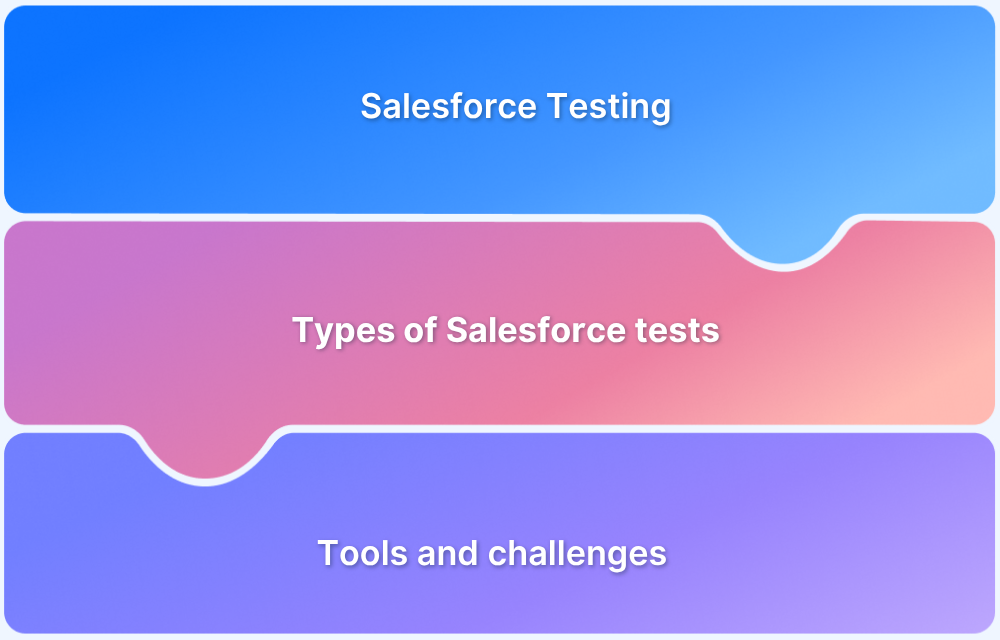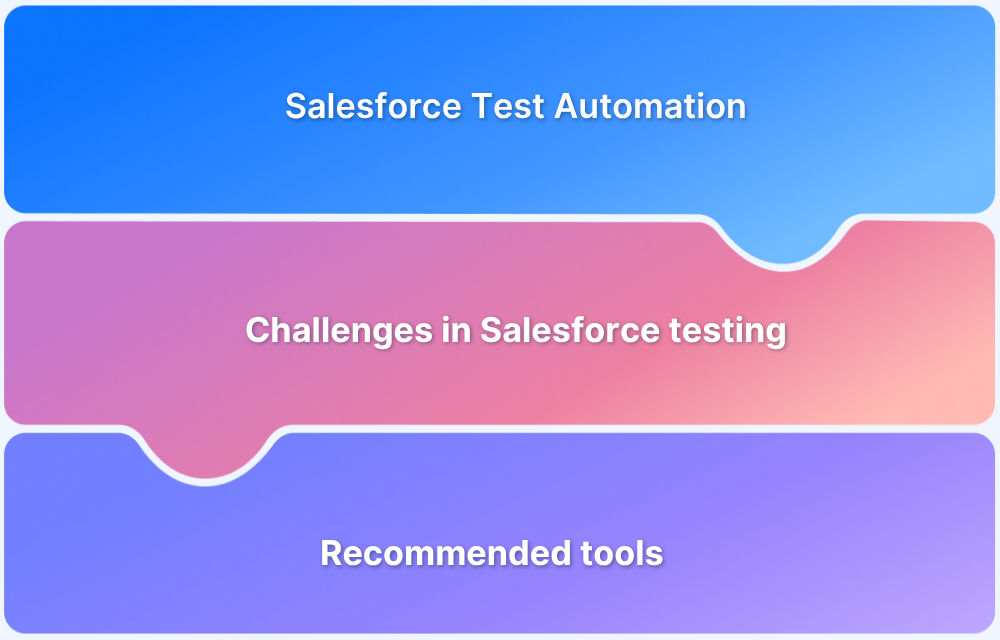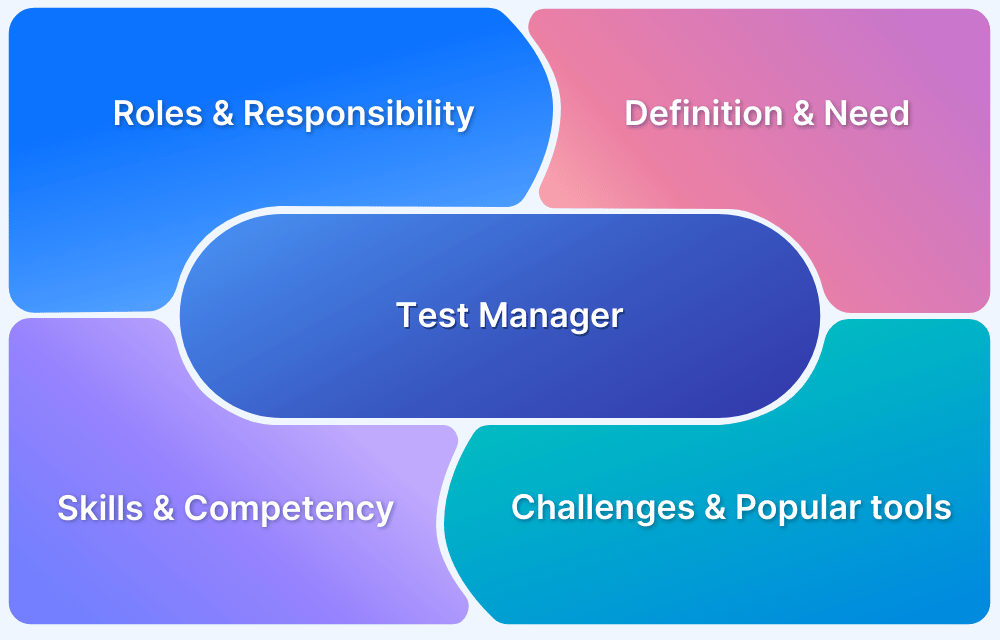Salesforce testers validate workflows, integrations, and customizations within Salesforce environments. They ensure the platform runs smoothly and aligns with business goals.
Overview
What is Salesforce Testing?
Salesforce testing is the process of validating the configuration, customization, and functionality of Salesforce applications. It ensures that new changes do not break existing features and that the platform performs as expected across all user scenarios.
Roles and Responsibilities of a Salesforce Tester
Salesforce testers play a critical role in ensuring system reliability. They combine domain knowledge with testing expertise to find defects early, confirm data integrity, and ensure seamless user experiences.
- Test Planning: Define test scope, strategy, and objectives based on business and technical requirements.
- Test Case Development: Create detailed test cases covering functional flows, edge cases, and validations.
- Test Execution: Run manual or automated tests, capture results, and verify expected behavior.
- Regression Testing: Re-test existing features to ensure updates or fixes don’t introduce new bugs.
- Performance Testing: Measure system speed, responsiveness, and stability under load.
- Security Testing: Check access controls, permissions, and data visibility across user roles.
- Integration Testing: Validate data flow and interaction between Salesforce and external systems.
- System Testing: Test the complete application to ensure all components work together as intended.
This blog explains the key roles and responsibilities of a Salesforce tester and how each task ensures a reliable and secure system.
What is Salesforce Testing?
Salesforce testing ensures that workflows, customizations, and integrations work correctly according to business needs. It covers functional, regression, and user acceptance testing to validate system behavior and data accuracy.
Automation testing plays a key role in scaling this process. With tools like Selenium, teams can automate test scenarios and run them on platforms like BrowserStack to verify Salesforce across browsers and devices. This helps ensure consistent behavior and user experience across environments.
Salesforce Tester Roles and Responsibilities
Salesforce testers plan and execute tests to validate workflows, customizations, and integrations. They set up test environments, build test automation, and ensure quality through functional, regression, and integration testing.
Here are the core Salesforce testing roles and responsibilities:
1. Test Planning
Salesforce testers define the scope of testing based on business requirements, identify test objectives, and choose the right approach for each component. They coordinate with stakeholders to align timelines and ensure the test planning process supports upcoming releases.
2. Test Case Development
Salesforce testers create detailed test cases that mirror real-world Salesforce workflows, including custom objects, validation rules, and role-based access. Effective test case development ensures cases are reusable, traceable to requirements, and ready for both manual and automated runs.
Also Read: Test Case Templates with Example
3. Test Execution
During the test execution phase, testers validate that workflows, validations, and custom logic behave as expected in a controlled environment. They document outcomes, report defects with clear steps, and collaborate with developers to confirm fixes and ensure proper functionality.
Read More: What are Test Execution Tools?
4. Regression Testing
Salesforce testers maintain a regression testing suite to verify that updates or code changes don’t break existing functionality. This is especially important after Salesforce releases, custom deployments, or third-party integrations to avoid introducing new issues.
Also Read: How to Prepare a Regression Test Suite
5. Performance Testing
In performance testing, Salesforce testers simulate high user loads and bulk data operations to measure response times and system stability. They identify bottlenecks or latency issues early to ensure the platform performs reliably as usage scales.
6. Security Testing
Salesforce testers perform security testing to validate access controls, permission sets, and data visibility settings. They check for unauthorized access and insecure configurations and ensure compliance with internal security policies and external regulations.
7. Integration Testing
Integration testing verifies that data flows smoothly between Salesforce and connected systems like ERPs or marketing tools. Testers validate data formats, sync accuracy, and error handling to ensure all systems work together without logic breaks or data loss.
Read More: What is System Integration Testing
8. System Testing
Salesforce testers perform complete system testing by combining all modules, customizations, and business logic in a single flow. This helps uncover system-level issues that may not appear in isolated tests and ensures overall stability before release.
9. User Acceptance Testing (UAT)
Salesforce testers support user acceptance testing (UAT) by preparing realistic test data, guiding business users through test scenarios, and capturing feedback. They ensure the system aligns with real-world use cases and meets business requirements before deployment.
Also Read: User Acceptance Testing (UAT) Checklist
10. Documentation
Testers maintain detailed records of test plans, executed test cases, results, and defect logs. This documentation supports future testing cycles, improves traceability, and ensures teams are prepared for reviews, handovers, or audits.
Skills Required to Become a Salesforce Tester
Salesforce testers need both technical and testing skills to validate complex workflows and system behavior. Here are the key skills required to become a Salesforce QA tester.
- Software Testing Fundamentals: A Salesforce tester must understand how to design test cases, execute them, and log defects clearly. This includes knowing different test types like functional, regression, and system testing. They should also know how to manage test cycles and track progress across sprints.
- Salesforce Platform Knowledge: Testers should be familiar with core Salesforce components such as standard objects, custom fields, workflows, and validation rules. They must also understand Apex triggers, Visualforce pages, and Lightning components to test custom features effectively. This helps identify issues specific to Salesforce configurations.
Read More: Salesforce Test Automation (Tools included)
- Test Planning and Design: Planning starts by reviewing business requirements and defining what needs to be tested. Testers create structured, detailed test cases that reflect real use cases across different roles and modules. This ensures the test suite provides broad and relevant coverage during execution.
- Test Data Management: Salesforce testers must prepare clean, realistic test data that mirrors production scenarios. They work with tools like Data Loader and Workbench and use SOQL to create or validate records. A good grasp of object relationships is essential to avoid broken test flows and inaccurate results.
Also Read: Top 15 Test Data Management Tools
- Coding Skills: While testers may not write full programs, basic knowledge of Apex, Java, or JavaScript is valuable. It helps them understand how custom code behaves and where errors might occur. This also enables them to assist in test automation or validate system logic more effectively.
- API Testing: Since Salesforce often integrates with external systems, testers must know how to validate API behavior and data flow. They should understand how requests and responses impact business logic and system reliability. This ensures smooth communication between Salesforce and connected platforms.
Also Read: What Is API Automation Testing?
- CI/CD and Deployment Processes: A QA with knowledge of continuous integration (CI), continuous delivery (CD), and continuous testing (CT) can easily integrate automated tests into pipelines, detect issues early in the release process, and keep testing aligned with fast deployment cycles. This ensures stable releases without slowing down development.
Read More: Understanding CI, CD, and CT in DevOps
How BrowserStack Helps with Salesforce Testing?
Salesforce testers are responsible for ensuring that complex workflows, dynamic components, and integrations function correctly across all user scenarios. Performing these tests manually across multiple browsers, devices, and Salesforce environments is often time-consuming and prone to errors.
BrowserStack provides a cloud-based, AI-powered solution that empowers testers to validate Salesforce applications efficiently and reliably.
BrowserStack enhances Salesforce testing in several key ways:
- Streamlined test creation with AI: Testers can define objectives and let AI generate automated tests, significantly reducing setup time and manual effort.
- Real-device and cross-browser validation: Execute tests on a broad range of real browsers and devices to ensure consistent behavior and user experience.
- Reliable handling of dynamic Salesforce elements: Metadata-aware locators make it easier to manage fields, components, and UI changes without breaking test scripts.
- Faster release cycles with confidence: Comprehensive regression and functional testing can be executed quickly, allowing teams to identify issues early and maintain high-quality releases.
By using BrowserStack, Salesforce testers can focus on analyzing results and improving application quality rather than managing complex testing environments, ensuring every release meets both functional and user experience standards.
Conclusion
Salesforce testers validate custom workflows, integrations, and configurations to ensure each release meets business needs and maintains system stability. They plan and execute test cycles, manage test data, and contribute to automation to support faster, high-quality delivery.
BrowserStack simplifies and accelerates Salesforce testing by providing a cloud-based, AI-powered platform for both manual and automated validation. Testers can execute workflows, regression tests, and dynamic component checks across real browsers and devices without setup overhead.








